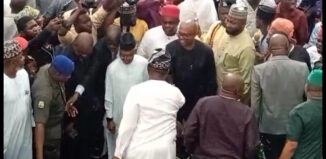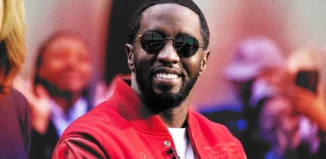I anchored a Newswatch cover story on our judiciary in May 1986. The story, Judiciary on Trial, was published in the issue of the magazine dated May 26, 1986. The decision to write the story arose from allegations of corruption and other problems that were negatively affecting the administration justice. Was there a basis for the allegations? Was the refuge of the common man turning into the graveyard of the common man?
We set out to find out. We believed the public needed to know the truth. An expose in the professional tradition of the magazine as a credible medium of public record could force the powers that be to look into the matter and prevent the citadel of justice from sinking into the citadel of injustice. We all, rich and poor alike, needed judicial protection. That was some 38 years ago. Time flies.
In the current climate of public criticism and disenchantment with the judiciary that may lead to the loss of public trust and confidence in it, I revisited the Newswatch story. We borrowed the title of the story from Justice S.O. Ilori, then of the Lagos State High Court, who told the world about a year before our story was published: “Once again, I have to repeat that we are now surrounded by an atmosphere where the whole judicial system is on trial.”
Some 38 years ago, the judicial system was on trial. I wish to report that it is still on trial. It is still hobbled by the same failings that afflicted it 38 years ago. At a special session of the Supreme Court in Enugu in March 1985, Justice George Sowemimo, Chief Justice of Nigeria, said that the state judiciary was “…very sick and requires an urgent surgical operation to save it.” The system is sicker now than then.
Our form of government rests on three pillars. The integrity of the judiciary and public confidence lie in its ability to be just and fair in deciding the cases brought before it. The loss of public trust in it is akin to destroying the third pillar. Our form of government cannot stand on two pillars. No one should take it lightly.
All our interviewees at the time spoke of the fundamental problems they believed were crippling the judiciary and making it difficult for it to discharge its constitutional responsibilities. They spoke of a judiciary cornered by the rich. Col (as he was then) David Mark, Governor of Niger State, said, “Events have shown that the judiciary has become the protector of the rich and an instrument to be used by those who have to trample on the have-not.”
Major-General Muhammadu Buhari, the immediate past president, told the Voice of America that the “…richer you are, the more likely you are to get justice.” This has not changed. Justice is still bought and sold.
Our findings confirmed that corruption was rife in the judiciary. Justice Alhassan Idoko, at the time chief judge of Benue State (he is now late) told Newswatch that “magistrates and area court judges in the state receive bribes in order to suppress cases being tried in their courts.” In 1984, chief judges of ten northern states asked the government to purge the judiciary because of corruption.
The judiciary was corrupt then. It is more corrupt now. In what it called a pilot survey of corruption index in the judiciary released by its chairman, Professor Bolaji Owasanoye, a couple of years ago, the Independent Corrupt Practices and other Related Offences Commission (ICPC), said that about N9,457,650,000 was offered and paid as bribes by lawyers.
The 84-page report said that “The level of corruption in the justice sector was heightened by stupendously high amounts of money offered as bribes to judges by lawyers handling electoral and other political cases. Demands are made by court officials, including judges, while lawyers or litigants make bribery offers and payments.”
DSS operatives carried out midnight raids on the homes of selected justices, including the then Chief Justice of Nigeria, Justice Onnoghen, on October 8, 2016, in what the NBA condemned as a gestapo operation as part of the anti-graft war in the judiciary.
The objective was dubious, but DSS said that “the searches …uncovered huge raw cash of various denominations, local and foreign currencies, with the real estate worth several millions of naira and documents affirming unholy acts by these judges.”
They spoke of a judiciary deliberately put on a short leash by the executive arm of government by denying it financial autonomy. It was on a short leash then; it is on a short leash now. Justice Ibrahim Muhammad, the then Chief Justice of Nigeria, told the special session of the Supreme Court marking the commencement of the 2019/2020 legal year on September 23 that he begged for funds every month to run the judiciary.
He said “…when we assess the judiciary from financial perspective, how free can we say we are? The annual budget of the judiciary is still a far cry from what it ought to be. The constitution provides for separation of powers of the three arms of government. I am using this medium to appeal to governments at all levels to free the judiciary from the financial bondage it has been subjected to over the years.”
Financial autonomy for the judiciary has been reluctantly granted to it at the centre, but the state governors still use the financial dependence of the judiciary to bend its will. There is no debating this: the financial independence of the judiciary strengthens it. “The independence of the judiciary,” said Justice Uche Omo, a justice of the Court of Appeal at the time, “will be mere talk and a farce if its members have to count the pennies every month to ensure that they are able to meet the minimum commitments.”
They spoke of politicians packing the judiciary to the rafters with men and women in want of competence, courage, and integrity. They spoke of political pressures on judges at the lower and higher benches. These pressures perhaps led the late Justice AtandaFatai-Williams, a former Chief Justice of Nigeria, to lament: “I have honestly come to the conclusion that, in terms of job satisfaction, it is better to be a mere justice of the court than to be the chief justice. In the former capacity, one’s job is all law and no nonsense.”
In the 38 years since we published the cover story under reference in the magazine, few things have fundamentally changed for the better in the judiciary. It is much worse now than then. The politicians have dragged the judiciary into politics and politics has poisoned the judiciary. You know what this means. In case you don’t, it means greater corruption in the system.
Some senior lawyers carry out the unholy act of delivering Ghana-must-go bags to judges, the sight of which weakens the spindly legs of professional and moral commitment to law and the rule of law.
Thanks to the politicians, judges increasingly vote through legal technicalities to impose their choices on the people in every election circle. This is often the time for lawyers and judges to vastly increase the content of their bank accounts. The judiciary is expected to play a minimal role, not an overarching role in our national politics. This is the way of participatory democracy.
Corruption is at the root of conflicting judgments, some of which, as I like to say, make first year law students wince. Okoi Ofem Obono-Obla, a senior lawyer, put it this way: “In recent times consistency and certainty, which are the cornerstones of the legal system hinged on the judicial precent appears to have been fast eroded especially in election litigations in the country so much so that the judiciary rather than playing its traditional constitutional role of being an interpreter of the law and an instrument of conflict resolution is rather seen as the harbinger of anarchy and confusion.”
Let me pile it on and cite a recent instance of what Professor Chidi Odinkalu described as ‘political ruin.’ Caleb Manasseh Mutfwang (PDP) defeated his APC rival, Nantawe Goshwe, in the governorship election last year. The loser challenged the winner at the governorship election tribunal and lost.
He went to the Court of Appeal. In a wilful judicial act, the Court of Appeal ignored precedent and nullified the judgement of the tribunal. Mutfwang went to the Supreme Court. The apex court was horrified by the decision of the lower court and reversed its ruling. Justice Emmanuel Agim who delivered the lead judgment said, “The legal profession should wake up.”
The same Court of Appeal nullified the election of two PDP senators and 16 PDP members of the state House of Assembly for the same reason it cited in the case of Mutfwang. The apex saved the governor, but its decision cannot save the legislators because the buck in their own case stops at the Court of Appeal. Justice Inyang Okoro of the Supreme Court underlined this when he said: “My only worry is that a lot of people have suffered as a result of the Court of Appeal’s decision.”
It should be no small worry for the nation and its citizens. We are going down a dangerous path with corruption trumping judicial integrity and the law. When a court messes you up, you remain messed up. It should be unacceptable.



